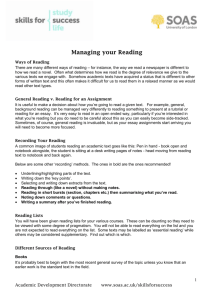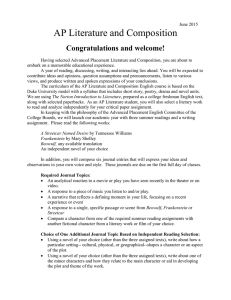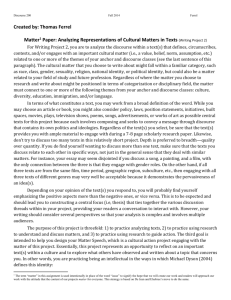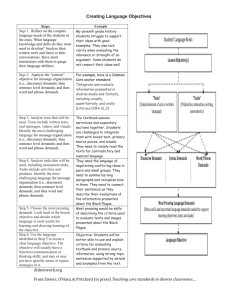The Literature of Human Rights
advertisement
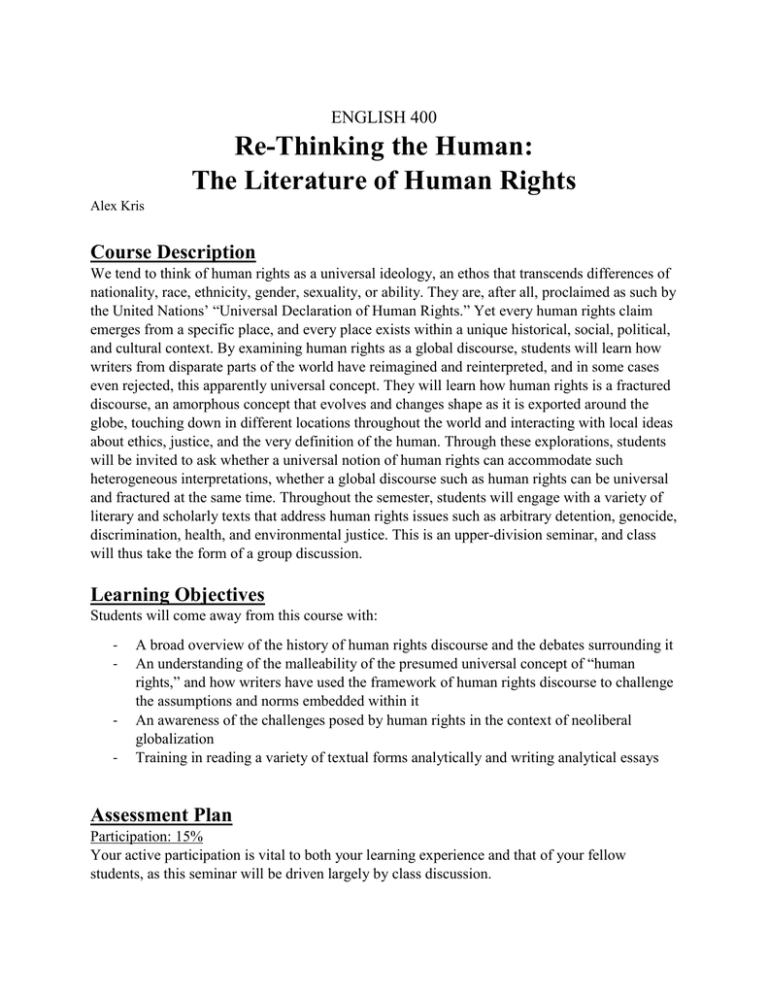
ENGLISH 400 Re-Thinking the Human: The Literature of Human Rights Alex Kris Course Description We tend to think of human rights as a universal ideology, an ethos that transcends differences of nationality, race, ethnicity, gender, sexuality, or ability. They are, after all, proclaimed as such by the United Nations’ “Universal Declaration of Human Rights.” Yet every human rights claim emerges from a specific place, and every place exists within a unique historical, social, political, and cultural context. By examining human rights as a global discourse, students will learn how writers from disparate parts of the world have reimagined and reinterpreted, and in some cases even rejected, this apparently universal concept. They will learn how human rights is a fractured discourse, an amorphous concept that evolves and changes shape as it is exported around the globe, touching down in different locations throughout the world and interacting with local ideas about ethics, justice, and the very definition of the human. Through these explorations, students will be invited to ask whether a universal notion of human rights can accommodate such heterogeneous interpretations, whether a global discourse such as human rights can be universal and fractured at the same time. Throughout the semester, students will engage with a variety of literary and scholarly texts that address human rights issues such as arbitrary detention, genocide, discrimination, health, and environmental justice. This is an upper-division seminar, and class will thus take the form of a group discussion. Learning Objectives Students will come away from this course with: - - A broad overview of the history of human rights discourse and the debates surrounding it An understanding of the malleability of the presumed universal concept of “human rights,” and how writers have used the framework of human rights discourse to challenge the assumptions and norms embedded within it An awareness of the challenges posed by human rights in the context of neoliberal globalization Training in reading a variety of textual forms analytically and writing analytical essays Assessment Plan Participation: 15% Your active participation is vital to both your learning experience and that of your fellow students, as this seminar will be driven largely by class discussion. Weekly Journals: 10% Each week, you will be expected submit to the course blog a short (1 or 2 paragraphs) response to the assigned readings for that week. This post should identify a key theme or passage from the text that you would like to discuss in class, and should pose a discussion question. This will be due by 8 P.M. Monday night. You may choose three weeks to opt out of this task. In addition, you will be expected to respond to one of your peer’s posts on the blog each week. You may also choose three weeks to opt out of this task. This blog will be set to private, so only members of this class will have access. Class Presentation: 10% Each student will choose one week to make a presentation in front of the class. For this presentation, you will need to find one outside scholarly article related to the text on which you are presenting. You will spend 5-10 minutes summarizing this article and relating it to the text we are reading that week. I can provide suggestions for article selection for those who would like help with this. Close-Reading Papers: 40% (4 Papers, 10% each) At the end of each unit, you will be expected to submit a short (2-3 pages double-spaced) critical analysis of one of the texts covered in that unit. In this paper, you should provide a close reading of one or two passages from the text you select and examine how these passages address one of the key themes discussed during that unit. Because these are close readings, you will not need to use outside sources for these papers. I will expect you to meet with me an advance to discuss your topics for each of these papers. Final Paper: 25% The final paper will be a research paper. This paper should explore a key theme from the course by tracing its development through two of the texts we read over the course of the semester. At least one of these texts must be a literary text. I will expect you to meet with me in advance to discuss your topic for this paper. Required Texts Robinson Crusoe by Daniel Defoe Waiting for the Barbarians by J.M. Coetzee If this is a Man by Primo Levi Nervous Conditions by Tsitsi Dangarembga Animal’s People by Indra Sinha Oryx and Crake by Margaret Atwood Weekly Course Plan Unit 1: The Foundations of Human Rights Week 1: Introduction (We will go over the syllabus together as a class, and I will explain exactly what is being asked of them with respect to the weekly journals, the class presentation, and the short papers. I will also remind them, though this is also on the syllabus, that they must meet with me in advance to discuss their topics on each of these papers and the final paper.) Week 2: The Foundations of “Human Rights” Readings: “The Universal Declaration of Human Rights” “The United States Bill of Rights” (This will be an introductory week, providing a foundational definition of “human rights” from which to depart. The historical documents they will read lay out the hegemonic narrative of human rights which the rest of the texts on the syllabus will interrogate, challenge, and reconfigure.) Week 3: Human Rights and the bildungsroman Readings: Robinson Crusoe by William Defoe (The bildungsroman, or coming-of-age narrative, is the paradigmatic literary form associated with human rights narratives, and Robinson Crusoe is regarded by many theorists of literature and human rights as the archetype of this form. The novel offers the normative model for the rational, individual subject who achieves true personhood by recognizing and subscribing to the norms and values of Western bourgeois society. In human rights discourse, he is the subject capable of laying claim to those rights. It is precisely this figuration of the human which creates friction when it is articulated at the local level, and students will spend a great deal of time analyzing this friction and how it manifests in the texts they read throughout the semester.) Unit 2: The Limits of Human Rights Week 4: Human Rights and the Nation State Readings: Arendt, Hannah. “The Decline of the Nation-State and the End of the Rights of Man.” (I am beginning each unit with theoretical materials so that they may practice applying theoretical concepts to primary texts throughout the ensuing weeks. These two essays address some of the inherent aporias within human rights discourse, most notably their reliance upon the nation-state to protect the rights of citizens. This sparks questions such as: how does a refugee without a national government to protect her rights lay claim to those rights? What happens when the state violates the human rights of its citizens? We would explore these questions in class discussion.) Assignment Due: Paper 1 (Bring Hardcopy to Class) Week 5: Genocide and the Limits of Human Rights Reading: Survival in Auschwitz by Primo Levi (The issue of genocide is a central focus of the global discourse on human rights, but because it is violence on such a massive scale, it can be difficult to comprehend and narrativize. Primo Levi’s memoir brings the conversation about genocide down to the level of the human, and will give students an opportunity to think through a problem that has perhaps more rhetorical currency than any other in the global discourse on human rights, and which has itself, ironically, been invoked as a way of justifying human rights violations. It makes particular sense to read this text after the Hannah Arendt essay, since both texts are addressing with the Holocaust.) Week 6: Human Rights and the Law Readings: Waiting for the Barbarians J.M. Coetzee The State of Exception by Giorgio Agamben (p. 1-40) (Waiting for the Barbarians is a short novel that illustrates the arbitrariness with which the law is implemented, and how it can just as easily be used to deny the rights of citizens as to uphold them by invoking what Agamben calls the “state of exception.” Of crucial importance will be the concept of anomie, of a place where the material content of the law no longer applies even though the sovereign continues to act with its force. In order to make this easier to understand, since Agamben’s work can be difficult and a bit opaque, we will begin class by brainstorming examples of the state of exception in real life, and write these on the board, before we discuss the Coetzee reading. It is a good follow-up to the readings by Arendt and Levi because it engages with the same questions, namely: who actually has rights and who can actually use them?) Week 7: Resource Rights and the Problem of Deregulation Readings: Ranciere, Jacques. “Who is the Subject of the Rights of Man?” Immerwahr, Daniel. Chapter 4 of Thinking Small. (This text can be used to spark two conversations. First, it illustrates what happens when the rights of individuals and communities to necessary resources come into conflict with the rights of the rights of the owners of the means of production to unrestrained capital accumulation, and second, it illustrates what happens when Western countries assume the universality of their ideologies and try to graft them directly onto communities with vastly different political, economic, and social milieus. This latter point will allow them to think concretely about Ranciere’s notion that humanitarian intervention is the corrupted form of human rights, whereby those who have no need of rights simply pass them on to someone else, usually communities in the Global South. Furthermore, it gives students an opportunity to apply the theoretical concepts they have been learning to an actual historical example rather than only fictional texts.) Unit 3: Human Rights in the Post-Colony Week 8: Colonialism and the Critique of Human Rights Readings: Fanon, Frantz. Foreword and Chapter 1: On Violence in The Wretched of the Earth. (I begin the unit with this excerpt from Fanon’s text for two reasons: first, because it draws attention to the violence inherent in the rhetorical act of articulating a universal model for human subjectivity, an articulation in which human rights discourse has historically been complicit, and second, because it insists upon, and convincingly argues for, the historical agency of subjects in the postcolonial world. This will frame the rest of the unit’s readings as a critique of Western human rights narratives.) Assignment Due: Paper 2 (Bring Hardcopy to Class) Week 9: The Post-Colonial bildungsroman Readings: Nervous Conditions by Tsitsi Dangarembga (This novel, a post-colonial revision of the bildungsroman, demonstrates the possibility for a Western genre to be re-appropriated by writers in the post-colony, in this case in Zimbabwe, and mobilized to draw attention to the West’s violent colonial history. By framing the novel as a postcolonial interpretation of a Western genre, this class will allow students to think through the ways universals move across the globe and are transformed not only by the specifics of place, but by the unique histories of the individuals who come into contact with them. The text also taps into debates about how race and gender complicate the referent of the human in human rights discourse.) Week 10: Environmental Justice in the Global South Readings: Nixon, Rob. “Introduction” in Slow Violence and the Environmentalism of the Poor. Animal’s People by Indra Sinha. (Sinha’s text, a fictionalization of the city of Bhopal in the years following the Bhopal Disaster, illustrates the unevenness with which human rights are distributed on a geographical scale, particularly when those rights include environmental justice. Reading it alongside the introduction to Rob Nixon’s text frames the novel as a critique of global deregulation policies that give multinational corporations free reign to dispose of toxic chemicals in impoverished areas in the Global South that have no legal recourse to hold them accountable. Students will only read half of Sinha’s text for this week, and finish it for next week.) Unit 4: The Limits of the Human Week 11: The Human Animal Reading: Animal’s People (This week will be a continuation of our discussion of Animal’s People. However, discussion will shift focus from the issue of toxicity and environmental rights to an interrogation of the question: what is a human? The novel begins with the titular character declaring that he no longer wishes to be human. This will smoothly transition into the final unit.) Assignment Due: Paper 3 (Bring Hardcopy to Class) Week 12: Redefining the Human Readings: Oryx and Crake (This is a longer novel that deals with a number of issues that complicate human rights discourse by obscuring the referent of the human, such as bio-engineering, gene-splicing, the virtualization of real space, etc. It calls for a redefinition, in the wake of these technological developments, of the term “human.” It makes sense to end with this novel for two reasons: first, it is fast-paced, entertaining, and should be absorbing enough to ensure that students actually read it, and second, because engages with almost all of the themes students will have encountered throughout the course. We will also take fifteen minutes at the end of class to discuss the final paper and what will be expected of them as they write that paper.) Week 13: Redefining the Human, cont. Readings: Oryx and Crake Week 14: Recap (I want to leave one week open for students to look back on the semester and doing the synthetic work of discussing how the different units may be in conversation with one another, and also to give them an opportunity to turn the conversation back on themselves, to articulate how their own ideas about human rights have changed over the course of the semester and how these ideas might be useful to them in the future.) Assignment Due: Paper 4 (Bring Hardcopy to Class) Final Paper: Due Electronically One Week after Final Class



